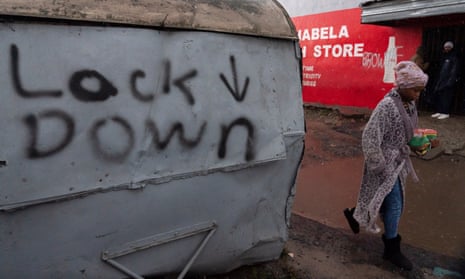The World Health Organization has warned that the coronavirus pandemic is accelerating in Africa, after the continent hit 200,000 cases earlier this week.
Speaking at a video briefing hosted by the UN press association in Geneva on Thursday, Doctor Matshidiso Moeti, the WHO’s regional director for Africa, said, “It took 98 days to reach the first 100,000 cases, and only 18 days to move to 200,000 cases.” Africa has so far recorded 5,635 deaths.
“Even though these cases in Africa account for less than 3% of the global total, it’s clear that the pandemic is accelerating.”
South Africa is the worst-affected country on the continent, with more than a quarter of all infections. But most countries have fewer than 1,000 infections, said Moeti, and the UN does not believe that severe cases are going undetected.
Africa has recorded fewer than 6,000 deaths, according to an AFP tally, but just five countries account for 70% of these: South Africa, Algeria, Nigeria, Egypt and Sudan.
In Africa, “the pandemic is still concentrated in and around capital cities but we are seeing more and more cases spread out into the provinces,” Moeti said.
She said that in most countries on the continent, the virus entered capitals through international flights from Europe.
Africa’s relatively young population compared to other continents, and in-built experience of dealing with disease outbreaks have been cited as reasons why Africa has not so far seen the death rates experienced on other continents.
Moeti said early action by African countries had helped keep the numbers low - but constant vigilance was still needed.
The US remains the worst-affected country worldwide, passing 2 million infections on Thursday. Spikes have been recorded in several states, including Arizona, which is confirming more than 1,000 cases daily.
US president Donald Trump has introduced a policy stopping attendees at his rallies from suing the campaign or venue if they contract coronavirus at the events. A statement on the campaign website page for a rally in Tulsa says: “By clicking register below, you are acknowledging that an inherent risk of exposure to COVID-19 exists in any public place where people are present. By attending the Rally, you and any guests voluntarily assume all risks related to exposure to COVID-19 and agree not to hold Donald J. Trump for President, Inc.; BOK Center; ASM Global; or any of their affiliates … liable for any illness or injury.”
Stocks fell sharply Thursday on Wall Street as coronavirus cases increased, deflating recent optimism for a quick economic recovery. The DOW Jones Industrial Average saw its worst day in weeks, closing down almost 7%. Asian shares were moderately lower on Friday as a result of the overnight rout.
The US Federal Reserve warned on Wednesday that a second wave of infections risks prolonging the country’s recovery. The Fed predicted unemployment will still be at around 9% by December – close to the worst levels seen in the GFC – but Federal Reserve chair Jerome Powell said that a second outbreak could mean that figure was optimistic.
UN children’s agency Unicef and the International Labour Organization warned on Friday that the economic effects of the pandemic risk pushing millions more children into child labour. A joint report released Friday also stressed that the crisis could push children already working to put in longer hours under worsening conditions. Others could be forced into the worst forms of labour, seriously threatening their health and safety, it said.
Other developments in the pandemic include:
There are 7,500,777 confirmed coronavirus infections worldwide, according to Johns Hopkins University data. There have been 420,993 known deaths so far. The true figures for deaths and infections are likely to be significantly higher due to time delays, differing testing rates and definitions, and suspected underreporting.
Brazil, which is the second hardest-hit country after the US, confirmed 30,000 new cases in 24 hours on Thursday, taking its total past 800,000. Under the leadership of Jair Bolsonaro, who has sought to downplay the pandemic, 40,919 people have died. Infections have increased by more than 40% in 21 US states this week, as the effects of relaxed restrictions start to be felt.
New Zealand is relaxing its borders to grant exemptions for certain workers and partners of New Zealand citizens to enter the country. The relaxed rules, which will see America’s Cup sailors included, come after 21 days with no new Covid-19 cases across the country and no current live cases. Health officials have said the virus would be considered eliminated after 28 days of no new cases.
Tokyo is poised to end all restrictions on businesses next week and karaoke venues, game arcades and pachinko parlours were set to reopen today on Friday. Tokyo’s governor, Yuriko Koike, said the city had entered “a new stage of living with the coronavirus,” adding that authorities would expand testing and ensure medical facilities were able to cope with a resurgence of the virus, which is known to have infected more than 17,000 people in Japan and killed 922.
Japanese “non-regular” workers posted its biggest drop on record in April, declining by 970,000 to 2.02 million. Women accounted for 710,000 of the decline. Many of Japan’s women, many women lack the job security of male workers, with more than half holding vulnerable part-time, contract or temporary jobs.
Fujifilm Holdings Corp will spend $928m to double capacity at a drug manufacturing facility in Denmark, which it has pledged to use in producing Covid-19 treatments, as the Japanese company steps up its pivot towards healthcare, Reuters reports.
